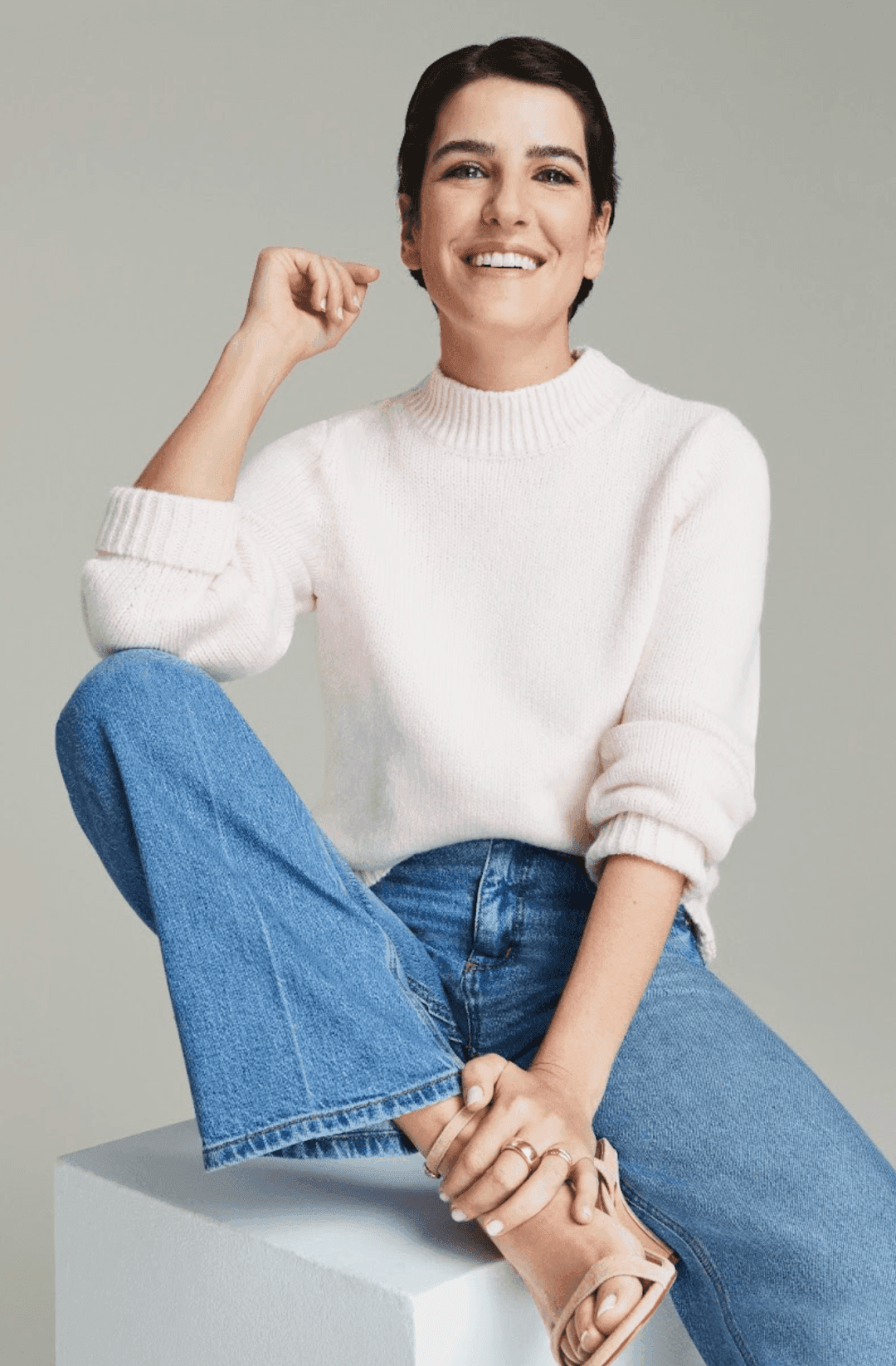
Marcella Kelson
Marcella Kelson is a licensed social worker, who primarily works with new mothers and women with cancer.
Marcella Kelson has firsthand experience with some of the most difficult scenarios for a parent of young children. A few months after giving birth to her second child, she received a diagnosis of triple-negative breast cancer (TNBC), an aggressive subtype that disproportionately impacts younger women, and has fewer treatment options. Her treatment involved 16 rounds of chemotherapy, 14 rounds of immunotherapy, a lumpectomy, followed by 20 rounds of radiation.
She’s also a life coach with masters degrees in developmental psychology and social work, who primarily works with new mothers and women with cancer. After her treatment, she started 'Motherhood Through Cancer', an online community, and started coaching women, especially young mothers, who receive a cancer diagnosis, and estimates she’s advised over a hundred women.
Her advice feels so helpful, because it’s up-front about the mess, difficulty, and heartbreak of navigating a cancer diagnosis, and the rest of your life all at once.
Below, Kelson offers the best advice she’s honed over her years of advising other women, particularly mothers with cancer.
How you spend your treatment time matters
There are these inflection points in life that I've always found so interesting, because they’re a catalyst for evolution and change. This is true for postpartum, this is true for any sort of trauma, this is true for loss. Any inflection point gives you this opportunity to really evaluate how you spend your time and how you spend your attention.
What you thought about in the darker moments of your life can reveal a lot about who you are genuinely. It's a moment where you're much more vulnerable, you have much more access to your values, your beliefs and mission and motivators. And so, I think it's such an opportunity, and oftentimes a missed opportunity, when you don't go deeper in those moments. It’s an opportunity to improve and reflect and sort of deepen your relationship with your own life.
I think how you use the time matters, or how I used the time [in treatment] mattered for me. I don't think it was time lost. I think it was time where I got to really reflect on my values and change elements of my life that weren't working. Ultimately I'm a much better parent because of that.
During treatment, it might not be your season to be a great parent
We have an unsustainable concept about how much we can do as a parent. It’s important to know that next time might be your season, your next shining moment as a parent. Now you're having a pretty difficult moment, it doesn't last forever.
I was doing chemo, immunotherapy, radiation and surgery. There was something to deal with every day, so at the beginning of treatment, I thought to myself, ‘Okay, for the next six months, I am going to do a lot less parenting. I can't be a great parent until my health is in a place where I can build a foundation for it.’ The love that I have for my kids is what got me through the treatment, it motivated me. But, on paper, if you looked at my day-to-day movements, I wasn't doing what you’d typically understand as ‘good parenting.’ But I was also doing something that in essence is good parenting. It's a time investment to parent later. You can actually spend that year improving and getting clarity and reflecting on your own life that it ultimately makes you a much better parent than if this never happened.
I missed a year because I was sick, but now I'm not missing very much at all, because I'm present in a way that I never would have been had I not seen the things I saw when I was sick. I am able to really put things in perspective. And I feel very lucky that this happened early in life, because it means that I have more opportunities to apply the perspective that most people don’t get until they're older.
You have a lot of remorse, but the upside of having this happen when your children are young is that you have all these parenting years ahead of you that you're going to do differently because you just don't take it for granted in the same way.

The first thing to do: find a mentor who you don’t have to explain yourself to
Without a doubt, the most effective thing is connecting with women who can relate directly to the experience—and also are further along [in their cancer experience]. When you see somebody who has survived and is thriving and has gone through this and found that life can be just as good, if not better, on the other side— to me, that's hope that is really grounded in evidence.
When you know that somebody has been in the darkest place imaginable and you were there too, there’s a nonverbal connection. You don't even have to explain it, and I think that’s healing. Because when we're sick, especially as young women, the way that people react to us, we actually end up taking care of them, right? How often does somebody learn about your situation and you end up having to take care of their reaction? When you're in the presence of somebody who's been there, you're not taking care of that person at all, and I think that that has a lot of power.
To banish guilt, meet other women like you
I think a lot of us live with [constantly asking ourselves] ‘how did I get here’? But then, whether it's virtual or in person, when you're in a room of people who clearly have done nothing wrong to get to where they got, then you’re given more permission to forgive yourself and to relieve yourself of that guilt.
Invest in some comfortable clothes you really love—then let them go
I had a year of treatment, and so for me, it was very worth investing in comfortable, light clothes. At the end of treatment, I got rid of everything. I did a big purge at the end of radiation. I just didn't want to see the clothes. The memories are too strong.
The thought ‘why would I invest in this if I'm gonna get rid of everything?’: that’s not the way to think about it. Being comfortable is so important when your insides feel like they’re dying. It's a moment when you feel so bad that doing good for yourself, indulging yourself, feels hard. It's a really weird experience, it's a cognitive dissonance. It's like: if I feel so badly, why would I allow myself to feel good? I think push yourself to at least get one basic outfit that you really love to be in and see if it makes a difference. It’s worth splurging on staples.
Don’t be afraid to ask for some psychopharmacological assistance
Antidepressants or anti-anxiety medication in an acutely terrifying period: that’s exactly when these tools are supposed to be utilized. There’s an idea to just get through it, because you're supposed to get through hard things. I think that’s really short sighted. Some aid to not feel terrified all the time, to not rev up your nervous system all the time, is a gift that you give yourself and everyone around you. It's healthy. It’s healthier being on a low-dose antidepressant and not feeling terrified all the time than it is to be in a situation where your nervous system is revved up all the time.
The first thing that I did when I got diagnosed was I went on a low dose antidepressant that also helps with anxiety. That was an incredibly important decision that I made, because I had to. I was so on edge and so scared and so overwhelmed about my kids, my husband—and that put so much pressure on me to sort of keep my moods and my emotional reactions regulated, when I really didn't have the tools to do that, because I was so fucking scared. A low dose antidepressant really helped me get through. And then as soon as I finished treatment, and I was feeling more stable, I tapered off.
But the other thing that I also did—this is my personal experience, not medical advice—I took a lorazepam every night to sleep during chemo and the reason I did that is because I had such crazy, vivid nightmares, and it really helped. I also could not have gotten through chemo without using CBD and THC to manage pain and nausea. I worked with a medical doctor to understand the best strains for my specific symptoms. I got a medical marijuana license so that I could also have access to the cleanest plants.
[Editor’s note: of course, this is advice to talk to your medical team about.]
Be very clear and actionable with your support group
This is an opportunity to reflect on what makes you really feel supported. Is it people calling? Is it people checking in? Is it people bringing you things and visiting? Or, is it the opposite? Do you need space and letting people reach out when you’re ready? Like, this person dropped off bagels on my front step, and I didn't have to see them, but it made me feel good that they thought of me. Another friend texted me to walk, ‘If you feel like leaving the house, you come join me. I will let you know when I'm walking, I’ll walk by your house. Don't respond, if you can't walk.’
This takes a large amount of straightforwardness, which is sometimes really hard for people. It’s inviting people to come to chemo with you if you think that they would be supportive, or telling people that you don't want visitors at chemo. There's a way of helping people help you. It might be sending an email to everybody who reached out and saying, ‘This is what's going on. I'm probably gonna go silent a little bit, but I'll communicate when I'm ready.’
Intrusive thoughts might be your really annoying, well-meaning neighbor for the rest of your life
I think about an intrusive thought like a really well-meaning, extremely annoying neighbor who is hyper-vigilant, but their ultimate goal is to keep the community safe. Am I going to be surprised on a Saturday morning when I'm having a beautiful morning when that neighbor rings the bell and tells me that there’s a weird car outside and it might be a murderer? I say, ‘I'm not surprised that you're here Saturday morning. I want to enjoy my children, so I don't want to stop and talk about this right now. I'm going to take the risk that this is an innocuous car, and I think you should go home and enjoy your day.’ But how quickly you can cycle through these thoughts makes a big difference, I think. You dismiss them and you let them go and you reorient them. And sometimes we need help: like cognitive behavioral therapy, or we need pharmaceutical anti-anxiety medication.
Processing is not a gentle experience
Processing is so not this gentle drip. You’re waterboarded with emotion. It's not a gentle experience.









